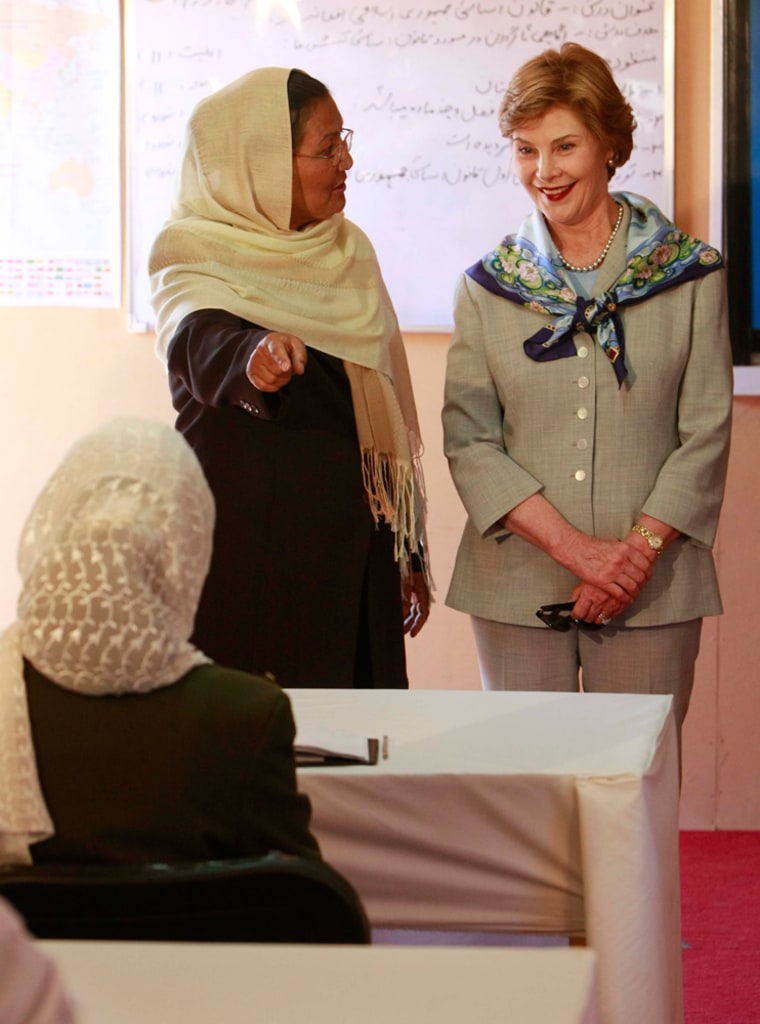First lady Laura Bush, on a mission to highlight signs of progress in war-weary Afghanistan, ventured outside the capital Sunday to an area that symbolizes both the destruction and attempt at rebirth.
On her third visit to the country, the first lady flew into Kabul before boarding a helicopter for a 50-minute flight to Bamiyan province, the farthest she has traveled from Afghanistan's largest city.
The helicopter landed in a dusty field at a provincial reconstruction team compound operated by New Zealand. From there she could see the empty niches in a cliffside where two giant Buddha statues once stood.
They were carved into the sandstone cliffs more than 2,000 years ago. The Taliban, which considered the statues idolatrous and anti-Muslim, demolished the treasures in March 2001, causing an international outcry. The repressive Taliban ruled Afghanistan until the U.S. invaded after the attacks of Sept. 11, 2001.
Bush's visit came ahead of a conference Thursday in Paris where the U.S. hopes other countries will pledge billions of dollars to help Afghanistan. She intends to address the conference.
‘Very crucial time’
"The people of Afghanistan don't want to go back and live like that," Bush told reporters during the nearly 14-hour flight to Kabul. "They know what it was like. The international community can't drop Afghanistan now, at this very crucial time."
President Bush, in an interview in Washington on Friday with RAI TV of Italy, said bluntly, "Afghanistan is broke."
Afghanistan is seeing a resurgence of violence and a spiraling heroin trade. Last year, more than 8,000 people were killed in insurgency-related attacks — the most since the 2001 invasion — and violence has claimed more than 1,500 lives this year.
On Sunday, insurgents attacked a police convoy in central Afghanistan, killing 11 police and wounding one, an official said. Militants in the east attacked and killed four men including a local government official. The BBC said the body of one its Afghan journalists was found after he had gone missing in Helmand province.
During her daylong visit, the first lady met with President Hamid Karzai, saw a police academy where female recruits are trained and planning to visit U.S. troops.
President Bush has defended Karzai against critics who say his government is weak and not doing enough to battle corruption and drug trafficking.
Karzai said at a news conference with the first lady on the grounds of the presidential palace that his government will go to the Paris conference with a "very realistic evaluation" of the past six years, including a look at problems such as corruption.
"We'll come back with some significant assistance from the international community to the Afghan people," Karzai said.
Laura Bush said the U.S. and other nations should not blame Karzai unless they are going to give him credit for all the progress being made.
"It's really not that fair," she told reporters before meeting the Afghan leader. "I think it's undermining, frankly, to blame him for a lot of the things that may or may not be his fault. He inherited — just by becoming president — a country that's been totally devastated. It is very, very difficult when you have al-Qaida and Taliban all over the borders and making incursions into Afghanistan, and it's intimidating for everyone."
Her trip sought to focus on signs of progress. While standing beside Karzai, she said, "We've been discussing a lot of other issues that have to do both with our partnership between the United States government and Afghanistan, as far as education is concerned, and all the other great projects I visited today, a lot of agriculture, a lot of other things."
Earlier, she met with women training at the National Police Bamiyan Regional Training Center. She celebrated the construction of a paved road linking the Bamiyan airport with its bazaar and town center and toured a learning center under construction that will double as an orphanage.
Several dozen future students, all school-age children in traditional white scarfs, sang to her at the center, a project of the U.S.-Afghan Women's Council. The council was set up to help women gain the skills and education deprived them under the Taliban.
‘Key to the success’
"Of course we want more girls in school and I think that's really key to the success of Afghanistan," Bush said. "There's a huge increase in the number of kids in school. There are almost 6 million kids in school now compared to 2001 when there were maybe a million, but no girls."
For the Paris conference, France has set a goal of raising $12 billion to $15 billion for Afghan reconstruction projects through 2014. The United States is looking to contribute about one-quarter.
International donors have pledged about $32.7 billion in reconstruction money for Afghanistan since 2001, including $21 billion from the U.S.
"A group of Afghan women who visited me most recently at the White House said: 'You know, we're really afraid. We think it is our chance right now, and if we don't get this chance — if Afghanistan backslides back into the Taliban — then we'll never get it,'" the first lady said.
"It's more important than ever for the international community to continue to support Afghanistan — certainly for the U.S. to continue to support Afghanistan — because we don't want it to be the way it was when the Buddhas were destroyed."
From Afghanistan, she planned to fly to Slovenia, joining her husband on Monday for his final U.S.-European Union summit. Her trip in Afghanistan goes along with the president's effort to convince European leaders that they have a keen interest in Afghanistan's future.
The U.S. worries that Europeans may not grasp the magnitude of the threat to them from radical elements in Afghanistan. The Bush administration wants European nations to provide additional military aid and more reconstruction money.
